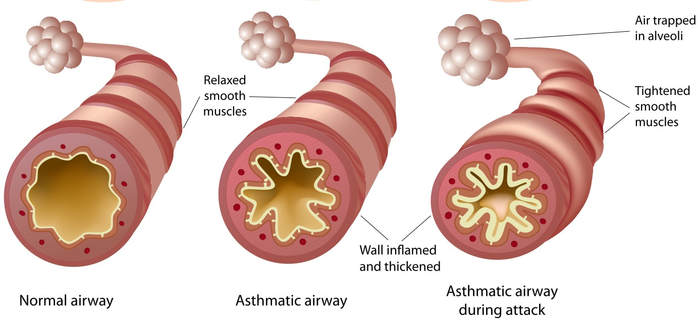Asthma
Overview
If you frequently experience shortness of breath or you hear a whistling or wheezy sound in your chest when you breathe, you may have asthma — a chronic condition that causes inflammation and narrowing of the bronchial tubes, the passageways that allow air to enter and leave the lungs. If people with asthma are exposed to a substance to which they are sensitive or a situation that changes their regular breathing patterns, the symptoms can become more severe.
According to the latest WHO data published in may 2014 Asthma Deaths in Malaysia reached 1,642 or 1.29% of total deaths. The age adjusted Death Rate is 8.22 per 100,000 of population ranks Malaysia #58 in the world. and are one of the leading causes of absences from work and school. Asthma often runs in families; according to the World Health Organization, about half the cases are due to genetic susceptibility and half result from environmental factors. Although there is no cure for asthma, effective treatments are available. Asthma can be best managed by seeing an allergist.
There are two types of asthma: allergic (caused by exposure to an allergen) and nonallergic (caused by stress, exercise, illnesses like a cold or the flu, or exposure to extreme weather, irritants in the air or some medications).
Asthma Symptoms
Asthma Triggers
Asthma Management and Treatment
Prevention of symptoms is the best strategy. A person with asthma should know what situations trigger an attack and avoid them whenever possible. If asthma attacks are severe, are unpredictable or flare up more than twice a week, consultation with an allergist can help to determine their cause and provide long-term treatment that controls or eliminates the symptoms.
Asthma Facts and Figures
Studies show that people with asthma who see a specialist, such as an allergist, reduce their:
If asthma is left unmanaged or is misdiagnosed, it can be deadly:
If you frequently experience shortness of breath or you hear a whistling or wheezy sound in your chest when you breathe, you may have asthma — a chronic condition that causes inflammation and narrowing of the bronchial tubes, the passageways that allow air to enter and leave the lungs. If people with asthma are exposed to a substance to which they are sensitive or a situation that changes their regular breathing patterns, the symptoms can become more severe.
According to the latest WHO data published in may 2014 Asthma Deaths in Malaysia reached 1,642 or 1.29% of total deaths. The age adjusted Death Rate is 8.22 per 100,000 of population ranks Malaysia #58 in the world. and are one of the leading causes of absences from work and school. Asthma often runs in families; according to the World Health Organization, about half the cases are due to genetic susceptibility and half result from environmental factors. Although there is no cure for asthma, effective treatments are available. Asthma can be best managed by seeing an allergist.
There are two types of asthma: allergic (caused by exposure to an allergen) and nonallergic (caused by stress, exercise, illnesses like a cold or the flu, or exposure to extreme weather, irritants in the air or some medications).
Asthma Symptoms
- Coughing
- Shortness of breath
- Chest tightness
- Wheezing (a whistling or squeaky sound in your chest when you breathe, especially when exhaling)
Asthma Triggers
- Outdoor allergens, such as pollens from grass, trees and weeds
- Indoor allergens, such as pet dander, dust mites and mold
- Certain drugs and food additives
- Irritants in the air, such as smoke, chemical fumes and strong odors
- Colds, the flu or other illnesses
- Exercise (although people with asthma can benefit from some exercise)
- Stress
- Weather conditions, such as cold air or extremely dry, wet or windy weather
Asthma Management and Treatment
Prevention of symptoms is the best strategy. A person with asthma should know what situations trigger an attack and avoid them whenever possible. If asthma attacks are severe, are unpredictable or flare up more than twice a week, consultation with an allergist can help to determine their cause and provide long-term treatment that controls or eliminates the symptoms.
Asthma Facts and Figures
Studies show that people with asthma who see a specialist, such as an allergist, reduce their:
- Symptoms
- Emergency room visits
- Hospital stays
- Visits to the doctor because they are sick
- Missed days from work or school
- Health care costs
If asthma is left unmanaged or is misdiagnosed, it can be deadly:
- Asthma is among the most common chronic childhood illnesses, accounting for 10.5 million missed school days a year. It also accounts for 14.2 million lost workdays for adults.
- Every year, about 14 million Americans see a doctor for asthma. About 1.4 million patients visit a hospital outpatient department for asthma; almost 1.75 million go to a hospital emergency room.
- The number of people in the U.S. diagnosed with asthma is increasing. The greatest rise in asthma rates is among black children, with an almost 50 percent increase from 2001 through 2009.
- Researchers estimate asthma-related costs, including the direct cost of health care and indirect costs such as decreased worker productivity, at around $60 billion annually.

